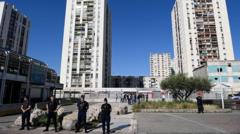Their meeting in Rome symbolizes the urgency for collaboration in a volatile international climate.
### European Leaders Seek Common Ground Amidst Differences

### European Leaders Seek Common Ground Amidst Differences
France and Italy’s political leaders, Macron and Meloni, aim for unity despite historical tensions.
In a significant moment for European diplomacy, Prime Minister Giorgia Meloni of Italy and President Emmanuel Macron of France are set to meet in Rome, marking Macron's first official visit to Italy since Meloni assumed office in 2022. This meeting follows a series of public disputes between the two leaders, shedding light on the rising necessity for European unity as global tensions escalate, particularly regarding the war in Ukraine and the need to maintain trade relationships with the United States amid a suspenseful political climate influenced by President Trump.
The backdrop of this meeting is a complex dynamic: Meloni represents the nationalist right, while Macron embodies a more globalist and technocratic perspective. Historically, they have engaged in public disagreements and mutual criticisms, underscoring a lack of chemistry between their respective political styles and ideologies. Meloni's political identity is heavily influenced by her roots in a nationalist, anti-immigration stance, while Macron’s persona is shaped by liberal internationalism and elitism, a stark contrast that has fueled tensions.
Nevertheless, experts and observers highlight the necessity for collaboration between these two leaders in order to address urgent, shared challenges. Jean-Pierre Darnis, who specializes in contemporary Italian politics, noted that the current global situation demands cooperation, rendering their well-documented dysfunction unsustainable. The upcoming discussions in Rome, including a proposed dinner, could be key to thawing the ice between Macron and Meloni, though the outcome remains uncertain.
Commentators have pointed out that while their differences are substantial, the international landscape may compel them to find ways to work together effectively. The juxtaposition of Meloni’s populist, nationalist credentials with Macron’s elite background serves not only as a barrier to understanding but also as an opportunity to reshape European politics in the face of pressing global issues. As tensions simmer both within and outside Europe, all eyes will be on Rome to see if this unlikely pairing can pave the way towards a more unified European front.
The backdrop of this meeting is a complex dynamic: Meloni represents the nationalist right, while Macron embodies a more globalist and technocratic perspective. Historically, they have engaged in public disagreements and mutual criticisms, underscoring a lack of chemistry between their respective political styles and ideologies. Meloni's political identity is heavily influenced by her roots in a nationalist, anti-immigration stance, while Macron’s persona is shaped by liberal internationalism and elitism, a stark contrast that has fueled tensions.
Nevertheless, experts and observers highlight the necessity for collaboration between these two leaders in order to address urgent, shared challenges. Jean-Pierre Darnis, who specializes in contemporary Italian politics, noted that the current global situation demands cooperation, rendering their well-documented dysfunction unsustainable. The upcoming discussions in Rome, including a proposed dinner, could be key to thawing the ice between Macron and Meloni, though the outcome remains uncertain.
Commentators have pointed out that while their differences are substantial, the international landscape may compel them to find ways to work together effectively. The juxtaposition of Meloni’s populist, nationalist credentials with Macron’s elite background serves not only as a barrier to understanding but also as an opportunity to reshape European politics in the face of pressing global issues. As tensions simmer both within and outside Europe, all eyes will be on Rome to see if this unlikely pairing can pave the way towards a more unified European front.




















